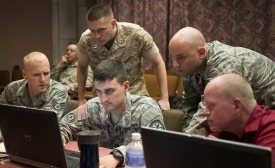social media

The challenges of countering ISIL's shrewd use of social media.
Done well, digital diplomacy ought to be the use of technology to deliver soft power and public policy messages, alongside the ability to engage with wider audiences of both state and non-state actors and use that feedback loop to understand more and to deliver better policy.
“When Indian Prime Minister Narendra Modi congratulated Chinese Premier Li Keqiang on his 60th birthday on his Sina Weibo account on Wednesday (July 1), he once again showed the high value he attaches to diplomacy through social media accounts,” the Global Times stated.
Rarely has amateurism in American foreign policy in the Middle East been as glaring and shocking as it has been in the past year with regard to Washington’s policy toward ISIS. In the United States during the past two weeks I have had the opportunity to follow more closely than usual news, analysis and political discussions about how Washington should respond to the threat of ISIS, and the experience has been frightening.

David S. Jackson on when trolling gets real.
U.N.: A military defeat of the Islamic State in Syria and Iraq could scatter extremists around the globe. Would the world be a safer place if the United States and its allies were to defeat the Islamic State in Iraq and Syria? Not necessarily, according to a senior U.N. counterterrorism official. Extremist fighters have proven remarkably adept over the past three decades at transforming themselves at the close of battles.
Prime Minister Narendra Modi seems to be combining a well-calibrated soft power push with his visit to China, leveraging social media, Bollywood and yoga to reach out to ordinary Chinese citizens.
New warnings from U.S. officials and lawmakers over tactics used by Islamic State online are putting renewed focus on the terror network’s activities. FBI Director James Comey warned Thursday that ISIS is increasing their reliance on social media to spread their “poison” message.







